Related Research Articles

Cameroon, officially the Republic of Cameroon, is a country in Central Africa. It shares boundaries with Nigeria to the west and north, Chad to the northeast, the Central African Republic to the east, and Equatorial Guinea, Gabon and the Republic of the Congo to the south. Its coastline lies on the Bight of Biafra, part of the Gulf of Guinea and the Atlantic Ocean. Due to its strategic position at the crossroads between West Africa and Central Africa, it has been categorized as being in both camps. Its nearly 27 million people speak 250 native languages, in addition to the national tongues of English and French, or both.

Paul Biya is a Cameroonian politician who is the second president of Cameroon since 6 November 1982, having previously been the prime minister of Cameroon from 1975 to 1982. He is the second-longest-ruling president in Africa, the longest consecutively serving current non-royal national leader in the world and the oldest head of state in the world. He is regarded as an authoritarian leader and a dictator.
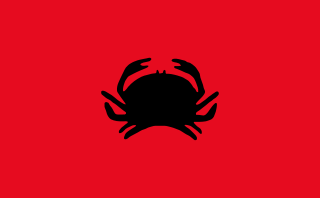
The Union of the Peoples of Cameroon is a political party in Cameroon.
Articles related to Cameroon include:
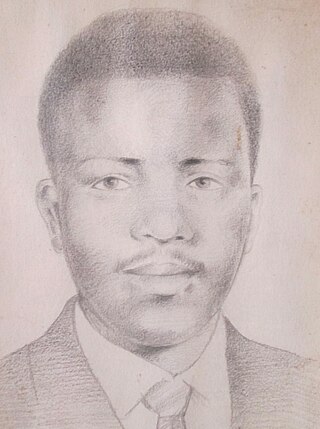
Félix-Roland Moumié was an anti-colonialist Cameroonian leader, assassinated in Geneva on 3 November 1960 by an agent of the SDECE with thallium, following official independence from France earlier that year. Félix-Roland Moumié succeeded Ruben Um Nyobé, who was killed in September 1958, as leader of the Union des Populations du Cameroun.
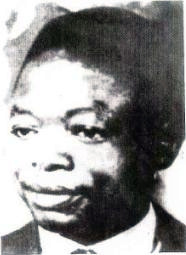
Ruben Um Nyobè was an anti-colonialist Cameroonian leader, slain by the French army on 13 September 1958, near his natal village of Boumnyebel, in the department of Nyong-et-Kellé in the maquis Bassa.

Andre-Marie Mbida was a Cameroonian statesman, a nationalist, the first Cameroonian to be elected Member of Parliament at the French National Assembly, a Prime Minister of Cameroon, the second African-born Prime Minister in Sub-Saharan Africa, the first Head of State of French-speaking autonomous Cameroon from 12 May 1957 to 16 February 1958, and the first political prisoner of independent Cameroon from 29 June 1962 to 29 June 1965.

French Cameroon, also known as the French Cameroons, was a French mandate territory in Central Africa. It now forms part of the independent country of Cameroon.
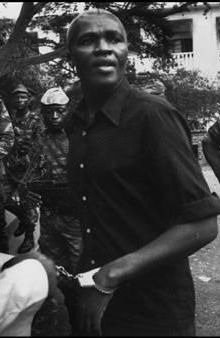
Ernest Ouandié was a leader of the struggle for independence of Cameroon in the 1950s who continued to resist the government of President Ahmadou Ahidjo after Cameroon became independent in 1960. He was captured in 1970, tried and condemned to the death penalty. On 15 January 1971, he was publicly executed in Bafoussam.
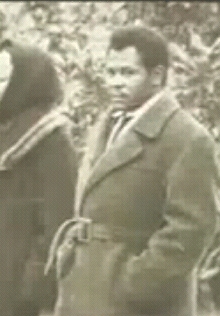
Abel Kingué was a political leader in the struggle for the independence of Cameroon from France.
Annette Jacky Messomo is a footballer who plays as a midfielder for Kosovan Women's Football League club KFF A&N. Born and raised in Cameroon, she is a naturalized citizen of Equatorial Guinea and has played for that women's national team.
The Cameroon War is the name of the independence struggle between Cameroon's nationalist movement and France. The movement was spearheaded by the Cameroonian Peoples Union (UPC). Even after independence, the rebellion continued, shaping contemporary politics. The war began with riots in 1955 and continued after Cameroon gained independence in 1960. Following independence, the first President of Cameroon, Ahmadou Ahidjo requested continued French military intervention to fight the UPC rebels. The UPC rebellion was largely crushed by the Cameroonian Armed Forces and French Army by 1964. This war is often forgotten because it occurred at the height of France's biggest colonial independence struggle, the Algerian War.

The Anglophone Crisis, also known as the Ambazonia War or the Cameroonian Civil War, is an ongoing armed conflict in the English-speaking Northwest and Southwest regions of Cameroon between the Cameroonian government and Ambazonian separatist groups, part of the long-standing Anglophone problem. Following the suppression of 2016–17 protests by Cameroonian authorities, separatists in the Anglophone regions launched a guerrilla campaign and later proclaimed independence. Within two months, the government of Cameroon declared war on the separatists and sent its army into the Anglophone regions.
This is a timeline of the Anglophone Crisis during 2019.

From 2018, the Anglophone Crisis drew increasing international attention, and became a challenge to Cameroon's foreign relations. Triggered by a violent crackdown on the 2016–2017 Cameroonian protests, the conflict escalated from a low-scale insurgency to a civil war-like situation. While Cameroon enjoys support from African countries, no country has openly supported the Ambazonian independence movements. However, many countries have put pressure on Cameroon to talk to the separatists. In addition, the separatists enjoy support from officers in the Nigerian Army, who have helped arrange arms deals for them.
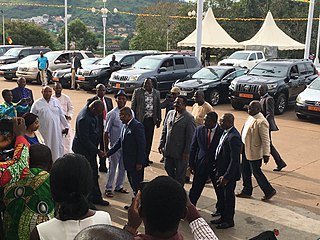
The Major National Dialogue is the official name of a dialogue between the Government of Cameroon and various opposition parties, aimed at resolving the Anglophone Crisis. The event took place between September 30 and October 4, 2019.
The following lists events that happened during 2020 in Middle Africa, also called Central Africa. The countries listed are those described are: Angola , Cameroon , Central African Republic , Chad , Democratic Republic of the Congo , Equatorial Guinea , Gabon , the Republic of the Congo , and São Tomé and Príncipe .
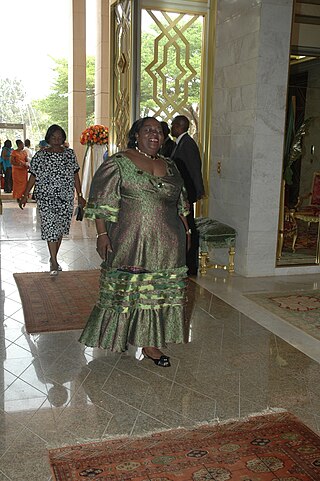
Françoise Foning was a Cameroonian businessperson and politician for the Cameroon People's Democratic Movement (CPDM). She began a career in business at age 12, opening a restaurant before entering into the tourism, transportation, food, medical and education sectors. Foning became president of CPDM's women's division in 1992 and was appointed the party's leader in Douala and the national committee five years later. In 2002, she was elected deputy mayor of Douala II and began serving in the National Assembly that same year. Foning led the African Network and Cameroonian Businesswomen and consulted The World Bank, the African Development Bank along with several international agencies. She was founding president of the Association of Cameroonian Businesswomen and the NGO World Female Company Managers. A street in Douala was named in her memory.
Julienne Niat Ngoumou was a Cameroonian politician. She was the president of the first national movement of Cameroonian women (Assofecam) in 1950 and the first woman to run for legislative elections in Cameroon in November 1951.
References
- 1 2 3 4 5 "Marthe Moumié, la veuve de Félix, retrouvée violée et étranglée au Cameroun" (in French). Bonaberi.com. January 9, 2009. Archived from the original on November 9, 2017. Retrieved November 8, 2017.
- 1 2 "Cameroun- Belgique : Hommage du Cercle Falix Moumia a Marthe Ekemeyong Moumia" (in French). AfricaPresse. February 13, 2009. Archived from the original on November 9, 2017. Retrieved November 8, 2017.
- ↑ Ngounou, Ingrid Alice; Houmfa, Mohamadou; Njayou, Bibiane (January 9, 2009). "Nécrologie: Marthe Moumié, la femme du leader indépendantiste camerounais retrouvée morte ce vendredi". Journal du Cameroun (in French). Archived from the original on November 9, 2017. Retrieved November 8, 2017.